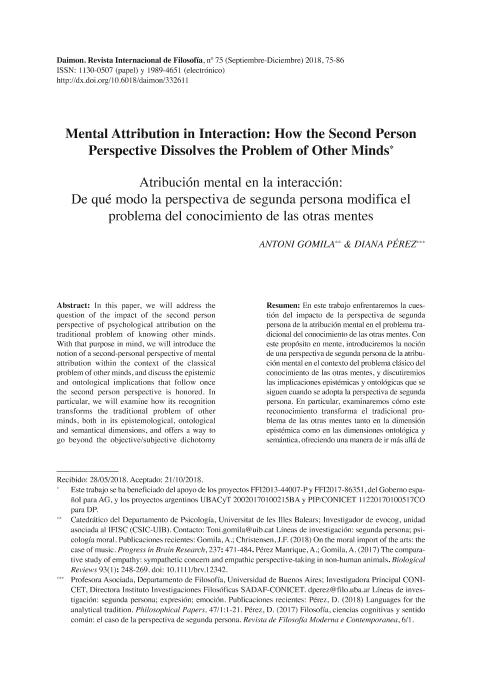Mostrar el registro sencillo del ítem
dc.contributor.author
Gomila Benejam, Antoni

dc.contributor.author
Perez, Diana Ines

dc.date.available
2020-01-31T20:25:25Z
dc.date.issued
2018-09
dc.identifier.citation
Gomila Benejam, Antoni; Perez, Diana Ines; Mental attribution in interaction: How the second person perspective dissolves the problem of other minds
; Universidad de Murcia; Daimon; 75; 9-2018; 75-86
dc.identifier.issn
1130-0507
dc.identifier.uri
http://hdl.handle.net/11336/96439
dc.description.abstract
En este trabajo enfrentaremos la cuestión del impacto de la perspectiva de segunda persona de la atribución mental en el problema tradicional del conocimiento de las otras mentes. Con este propósito en mente, introduciremos la noción de una perspectiva de segunda persona de la atribución mental en el contexto del problema clásico del conocimiento de las otras mentes, y discutiremios las implicaciones epistémicas y ontológicas que se siguen cuando se adopta la perspectiva de segunda persona. En particular, examinaremos cómo este reconocimiento transforma el tradicional problema de las otras mentes tanto en la dimensión epistémica como en las dimensiones ontológica y semántica, ofreciendo una manera de ir más allá de la dicotomía objetivo/subjetivo propia de la filosofía moderna. Una noción apropiada de intersubjetividad, argumentaremos, no es un simple agregado a esta dicotomía, sino que ofrece una manera de superar los problemas tradicionales que se siguen del paradigma filosófico moderno.
dc.description.abstract
In this paper, we will address the question of the impact of the second person perspective of psychological attribution on the traditional problem of knowing other minds. With that purpose in mind, we will introduce the notion of a second-personal perspective of mental attribution within the context of the classical problem of other minds, and discuss the epistemic and ontological implications that follow once the second person perspective is honored. In particular, we will examine how its recognition transforms the traditional problem of other minds, both in its epistemological, ontological and semantical dimensions, and offers a way to go beyond the objective/subjective dichotomy of Modern Philosophy. A proper notion of intersubjectivity, we will argue, is not a simple addition to this dichotomy, but it offers the way to get over the traditional philosophical problems that follow from this modern philosophical paradigm.
dc.format
application/pdf
dc.language.iso
eng
dc.publisher
Universidad de Murcia

dc.rights
info:eu-repo/semantics/openAccess
dc.rights.uri
https://creativecommons.org/licenses/by-nc-sa/2.5/ar/
dc.subject
INTERSUBJETIVIDAD
dc.subject
OTRAS MENTES
dc.subject
SEGUNDA PERSONA
dc.subject
AUTOCONOCIMIENTO
dc.subject.classification
Filosofía, Historia y Filosofía de la Ciencia y la Tecnología

dc.subject.classification
Filosofía, Ética y Religión

dc.subject.classification
HUMANIDADES

dc.title
Mental attribution in interaction: How the second person perspective dissolves the problem of other minds
dc.title
Atribución mental en la interacción : de qué modo la perspectiva de segunda persona modifica el problema del conocimiento de las otras mentes
dc.type
info:eu-repo/semantics/article
dc.type
info:ar-repo/semantics/artículo
dc.type
info:eu-repo/semantics/publishedVersion
dc.date.updated
2020-01-31T19:00:30Z
dc.journal.number
75
dc.journal.pagination
75-86
dc.journal.pais
España

dc.description.fil
Fil: Gomila Benejam, Antoni. Universidad de las Islas Baleares; España
dc.description.fil
Fil: Perez, Diana Ines. Consejo Nacional de Investigaciones Científicas y Técnicas; Argentina. Instituto de Investigaciones Filosóficas - Sadaf; Argentina
dc.journal.title
Daimon
dc.relation.alternativeid
info:eu-repo/semantics/altIdentifier/url/https://revistas.um.es/daimon/article/view/332611
dc.relation.alternativeid
info:eu-repo/semantics/altIdentifier/doi/http://dx.doi.org/10.6018/daimon/332611
Archivos asociados
